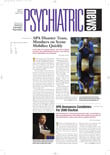For the first time, it appears, the risk of mental illness among American Indians has been compared with that of the general American population. One of the major findings to emerge from this comparison is that American Indians in two tribes had a lower lifetime risk of major depression than the general American population did.
The study, led by Janette Beals, Ph.D., an associate professor of psychiatry at the University of Colorado at Denver and Health Sciences Center in Aurora, Colo., was published in the September American Journal of Psychiatry.
From 1990 to 1992, the National Comorbidity Survey (NCS) was conducted to determine the prevalence of various psychiatric disorders in the general American population. The survey included more than 8,000 individuals. Indeed, the NCS has served as the standard reference to mental health prevalence in the United States since that time. Its successor—the National Comorbidity Survey-Replication—was published in June (Psychiatric News, July 15).
From 1997 to 1999, the American Indian Service Utilization, Psychiatric Epidemiology, Risk, and Protective Factors Project (AI-SUPERPFP) was undertaken to determine the prevalence of nine psychiatric disorders among two American Indian tribes—a Northern Plains tribe and a Southwest tribe. The disorders were alcohol abuse, alcohol dependence, drug abuse, drug dependence, dysthymic disorder, generalized anxiety disorder, major depressive disorder, panic disorder, and posttraumatic stress disorder. The survey included more than 3,000 persons. The project was expressly designed so that its results could be compared with those from the NCS.
Now Beals and her team have conducted such a comparison.
After adjusting for possibly confounding demographic variables such as gender, age, formal education, poverty, and marital status, one of their major findings was that both Indian tribes were at a greater lifetime risk for posttraumatic stress disorder and alcohol dependence than the general American population was. After taking possible confounding demographics into consideration, they also found that both Indian tribes had a lower lifetime risk of major depression than the general American population did.
While the first two findings did not surprise the researchers since past studies have suggested that American Indians have high rates of alcohol dependence and posttraumatic stress disorder, the third finding was unexpected. The researchers indicated, however, that perhaps they should not have been surprised because other ethnic and minority groups—African Americans, Hispanics, and Asian Americans—have also been found to be less afflicted by major depression than whites (Psychiatric News, May 20).
Beals and her team also used NCS and AI-SUPERPFP data to compare patterns of help-seeking behavior between the two Indian tribes and the general American population. Here, too, they found some differences. For example, whereas some 29 percent of the general American population with depressive or anxiety disorders sought help from psychiatrists or mental health professionals, only 12 percent of Southwest Indians and only 15 percent of Northern Plains Indians did.
In contrast, while only 8 percent of the general American population with a substance abuse problem sought help from a psychiatrist or mental health professional, 19 percent of Southwest Indians and 21 percent of Northern Plains Indians did.
Finally, the investigators scrutinized the AI-SUPERPFP data to get some idea of how often the two Indian tribes visited traditional healers for help with mental illnesses. For the Southwest Indians, 32 percent who had ever had a depressive or anxiety disorder, 26 percent who had ever had a substance abuse disorder, and 37 percent who had ever had any of the nine psychiatric disorders of interest had visited a traditional healer for help with it. The figures were somewhat lower for the Northern Plains Indians.
These findings, the researchers wrote, argue for more research on the role that traditional healing plays in the lives of American Indians. Especially needed are studies to determine whether particular traditional healing practices can counter particular mental illnesses.
“Studies of the outcome of such practices for specific mental health disorders have not been reported in the literature,” Beals told Psychiatric News. “[However,] our utilization data do suggest that they are seen as very valuable by significant numbers of American Indian individuals, and the testimony of individuals who have participated in such healing practices suggests that they can be very useful for many alcohol, drug, and mental health disorders.”
The study was financed by the National Institutes of Health.
Am J Psychiatry 2005 162 1723
